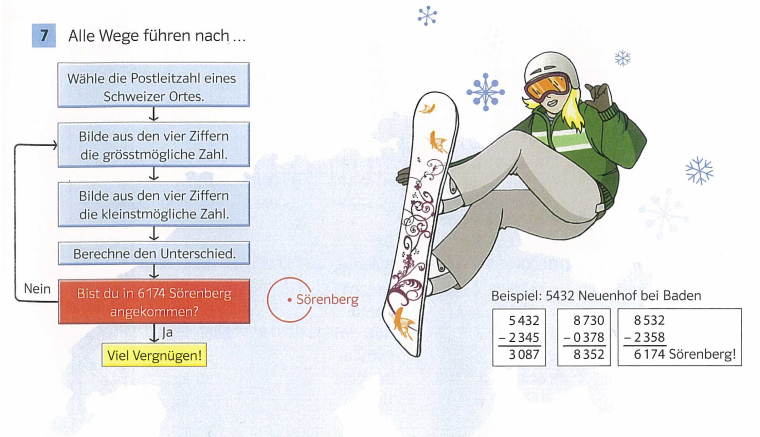| Re: Mini-Challenge: Zip Code Message #18 Posted by Thomas Klemm on 27 Sept 2010, 2:59 p.m., in response to message #1 by Thomas Klemm Quote:
Quote: Initialization:
10 STO 0
001 - 42,21,11 LBL A 022 - 30 - 002 - 32 0 GSB 0 023 - 9 9 003 - 32 0 GSB 0 024 - 0 0 004 - 32 0 GSB 0 025 - 20 × 005 - 43,30, 7 TEST 7 026 - 34 x<>y 006 - 34 x<>y 027 - 43 33 R-^ 007 - 33 R-v 028 - 30 - 008 - 43,30, 7 TEST 7 029 - 9 9 009 - 34 x<>y 030 - 9 9 010 - 33 R-v 031 - 9 9 011 - 43,30, 7 TEST 7 032 - 20 × 012 - 34 x<>y 033 - 40 + 013 - 43 33 R-^ 034 - 43 32 RTN 014 - 43,30, 7 TEST 7 035 - 42,21, 0 LBL 0 015 - 34 x<>y 036 - 45,10, 0 RCL ÷ 0 016 - 43 33 R-^ 037 - 43 44 INT 017 - 43,30, 7 TEST 7 038 - 43 36 LASTx 018 - 34 x<>y 039 - 42 44 FRAC 019 - 33 R-v 040 - 45,20, 0 RCL × 0 020 - 43,30, 7 TEST 7 041 - 34 x<>y 021 - 34 x<>y 042 - 43 32 RTN
Quote: Most numbers will end up with 6174. Only numbers composed of the same digit will end up with 0.
Quote: My observation was the same as described in Mysterious number 6174. (cf. "Which way to 6174?") So I guess I don't have to repeat that proof here. However I didn't ignore possible duplicates of the 55 numbers that remain after the first iteration.
Quote: Here's a small program that produces the 55 numbers left after the first iteration: Initialization:
9 STO 1 EEX 3 / STO 2
043 - 42,21,12 LBL B 055 - 42, 6, 2 ISG 2 044 - 45 1 RCL 1 056 - 43 32 RTN 045 - 9 9 057 - 42, 5, 1 DSE 1 046 - 9 9 058 - 43 20 x=0 047 - 9 9 059 - 43 32 RTN 048 - 20 × 060 - 45 1 RCL 1 049 - 45 2 RCL 2 061 - 26 EEX 050 - 43 44 INT 062 - 3 3 051 - 9 9 063 - 10 ÷ 052 - 0 0 064 - 44 2 STO 2 053 - 20 × 065 - 33 R-v 054 - 40 + 066 - 43 32 RTN Now you can switch between the two programs A and B:
B: 8991 A: 8082 A: 8532 A: 6174 The data was then used to create this graph. There's a direct proof in the same article as well. (cf. "Only 6174?") Again the HP-15C can be used to solve the system of linear equations:
| 1 0 1 -1 | | a | | 10 | | | | | | | | 1 1 -1 0 | | b | | 9 | | | | | = | | | 0 1 -1 -1 | | c | | 1 | | | | | | | | 1 -1 0 -1 | | d | | 0 | The solution is: [ a b c d ] = [ 7 6 4 1 ] I must admit that I wasn't aware of Kaprekar's constant. I just saw this arithmetic problem in that book which made me wonder why. So thanks a lot to Paul Dale for pointing this out. I know it wasn't a hard problem but still an occasion to use your best loved machines. Nevertheless I hope you enjoyed the contest.
Cheers and thanks for your contributions
Quote: Edited: 27 Sept 2010, 3:43 p.m. |
